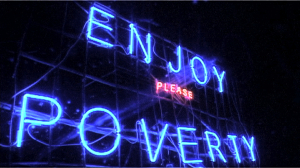Shot with minimal and remote means, Episode III is an uncinematic film in which the most stunning aspect of the production is the artist’s radical cynicism.
Martens oscillates between western messiah and unsentimental doom-monger as he gives advice, hope and (it seems) no assistance to villagers and plantation workers in Congo.
And yet his apparent cruelty has a critical function; he doesn’t flinch from demonstrating to his subjects, and to us, the pitiless reality of the global system in which they’re caught.
In one scene, he trains up a group of village photographers to shoot malnourished kids. But inevitably, they have no access to the market and fail to land the $50 per shot he promised.
This Dutch artist never flinches: not from showing children eating mice; nor from showing a flyblown corpse; nor from showing the anal sores of a young malnourished girl.
News commissioners would find this in very bad taste. But we know that the real bad taste is shown by the plantation owners buying arty black and white shots of their poor employees.
Martens uses neon – in invisible and knowing quote marks – to create a vast hoarding for his sub Saharan adventure: ‘Enjoy poverty,’ it reads, the word ‘please’ winking on and off.
After firing this up with a generator, we at least enjoy the least unhappy scene in the 90 minute film, as a host of children cheer and a party breaks out among local villagers.
The author of this film is unsparing of his subjects, sticking to the line they will always be poor so they may as well enjoy it; but he is equally hard on himself.
Towards the end of the film he meditates on the vanity which has brought him all the way to the war torn jungle to make a film which, as he must know, will further his career.
Nevertheless, he proves his case that poverty is a resource. “Experiencing your poverty makes me a better person,†he tells a group of prematurely aging paupers. They actually applaud him.
So there exists spiritual capital as well as economic capital. But this is something we have run short of in the West. Big Issue sellers, dare one say, just don’t have the requisite soulfulness.
Episode III can be seen in Chapter, Cardiff, as part of Artes Mundi 6.

No Comments